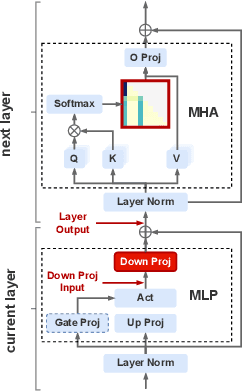Systematic Outliers in Large Language Models
Paper and Code
Feb 10, 2025



Outliers have been widely observed in Large Language Models (LLMs), significantly impacting model performance and posing challenges for model compression. Understanding the functionality and formation mechanisms of these outliers is critically important. Existing works, however, largely focus on reducing the impact of outliers from an algorithmic perspective, lacking an in-depth investigation into their causes and roles. In this work, we provide a detailed analysis of the formation process, underlying causes, and functions of outliers in LLMs. We define and categorize three types of outliers-activation outliers, weight outliers, and attention outliers-and analyze their distributions across different dimensions, uncovering inherent connections between their occurrences and their ultimate influence on the attention mechanism. Based on these observations, we hypothesize and explore the mechanisms by which these outliers arise and function, demonstrating through theoretical derivations and experiments that they emerge due to the self-attention mechanism's softmax operation. These outliers act as implicit context-aware scaling factors within the attention mechanism. As these outliers stem from systematic influences, we term them systematic outliers. Our study not only enhances the understanding of Transformer-based LLMs but also shows that structurally eliminating outliers can accelerate convergence and improve model compression. The code is avilable at https://github.com/an-yongqi/systematic-outliers.
 Add to Chrome
Add to Chrome Add to Firefox
Add to Firefox Add to Edge
Add to Edge